 Petzlover
Petzlover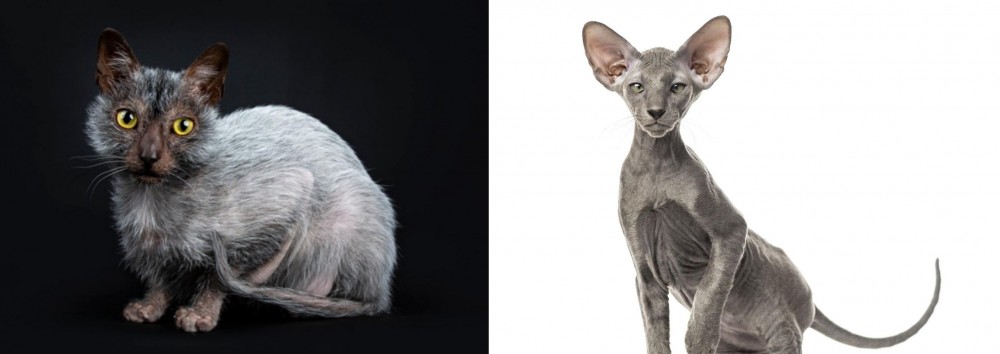 Lykoi is originated from United States but Peterbald is originated from Russia. Both Lykoi and Peterbald are of same weight. Both Lykoi and Peterbald has same life span. Both Lykoi and Peterbald has same litter size. Both Lykoi and Peterbald requires Moderate Maintenance.
Lykoi is originated from United States but Peterbald is originated from Russia. Both Lykoi and Peterbald are of same weight. Both Lykoi and Peterbald has same life span. Both Lykoi and Peterbald has same litter size. Both Lykoi and Peterbald requires Moderate Maintenance.
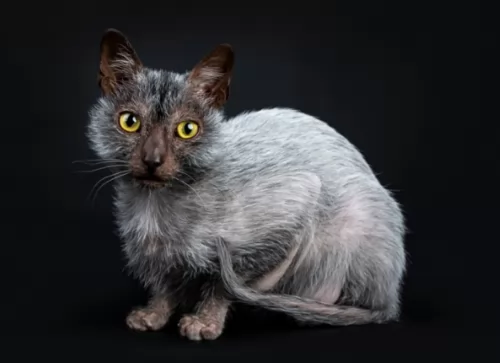 These cats were first discovered in 2010 in Virginia. It was Patti Thomas who named the breed Lykoi.
These cats were first discovered in 2010 in Virginia. It was Patti Thomas who named the breed Lykoi.
It was in 2012 that the cat breed went before the International Cat Association and is now recognized as a Championship Breed.
There is also work being done to expand the cat’s breeding program. It’s a naturally occurring gene in the feral cat population. There are still Lykoi cats born to the feral cat population.
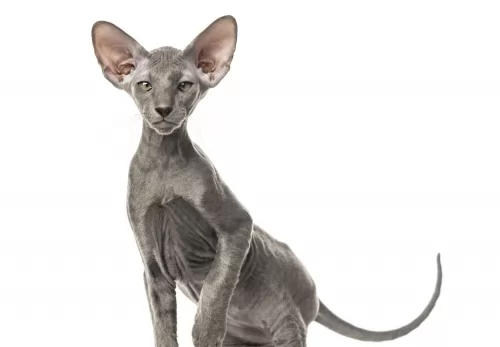 As a newer and rare cat breed, the Peterbald cat’s history is somewhat limited.
As a newer and rare cat breed, the Peterbald cat’s history is somewhat limited.
The breed was first developed in 1994, when a Russian breeder named Olga S. Mironova crossed an Oriental Shorthair cat with a Don Sphynx cat. This cat was to be known as the Peterbald.
The Peterbald cat is recognized by the Cat Fanciers Association. It was also accepted by The International Cat Association in 1997.
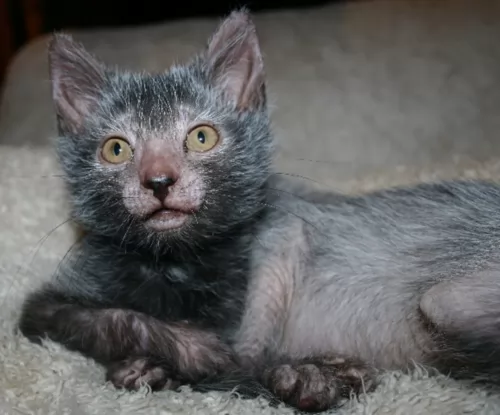 The Lykoi varies quite a bit in looks and you get some that are completely covered in hair and some that are actually partially hairless. Strangely, they are born with quite a lot of black fur.
The Lykoi varies quite a bit in looks and you get some that are completely covered in hair and some that are actually partially hairless. Strangely, they are born with quite a lot of black fur.
The cat has a solid black roan coat with no undercoat. Even though the cat is partially hairless, it molts a couple of times each year.
People are inclined to think that the little bit of hair would be wiry, when in fact it is soft and silky. It's just that it looks like bristles, but is actually not. People are always surprised by the coat's softness.
The Lykoi has a lean muscular body with large ears and eyes. He is a medium-sized cat and can weigh between 4 to 6kg.
The Lykoi is a friendly, people-oriented cat that is affectionate towards its human owners. This is also a playful cat breed and he is also intelligent and inquisitive.
The Lykoi is fond of his human family and makes a wonderful companion.
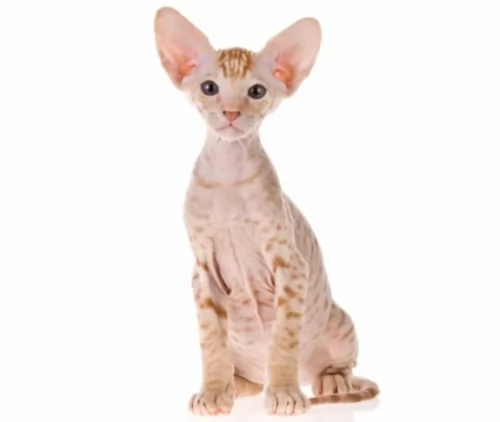 Looking a little bit futuristic, with a long, narrow head, almond-shaped eyes and large, pointed ears, the medium-sized, slimly built Peterbald cat can weigh between 3 and 6kg and is essentially a hairless cat.
Looking a little bit futuristic, with a long, narrow head, almond-shaped eyes and large, pointed ears, the medium-sized, slimly built Peterbald cat can weigh between 3 and 6kg and is essentially a hairless cat.
Although Peterbalds are considered a cat breed that are essentially hairless, not all of them are hairless as there are some that have a very short coat. There are some that are born with quite a bit of hair but they lose this.
In fact, their coat color as well as certain markings can be in various shades and patterns.
Peterbalds are easy-going, social cats with a sweet nature. They are affectionate towards their human companions and are quite vocal too, liking to talk to their owners. They are active and playful and enjoy playing with children and even other pets in the home.
In fact, they are adaptable cats and will slot into different home environments and lifestyles. The hairless variety is best as an indoor cat and this is why they suit living in apartments as well.
They are independent and intelligent, and people who have owned them say their pets often behave like a dog, wanting to be involved in their human's activities.
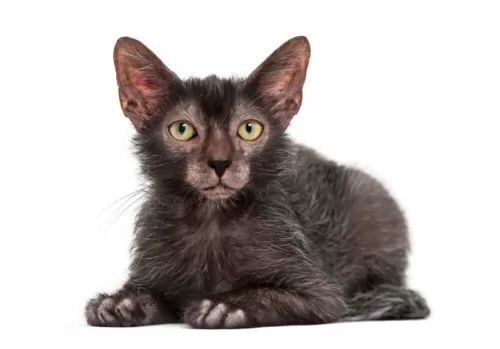 People who have owned the Lykoi say that they make a remarkable and devoted pet. They want a lot of attention and they’re willing to give attention as well.
People who have owned the Lykoi say that they make a remarkable and devoted pet. They want a lot of attention and they’re willing to give attention as well.
They’re social cats and want to spend time with their human companions. A cat that doesn’t receive the love and care it needs can become heartbroken and sick.
If you have one of these cats and your life has changed so that you can’t give it the attention it craves, at least provide it with a feline companion.
Cats aren’t all the aloof creatures they’re made out to be and your Lykoi is capable of making you a splendid companion.
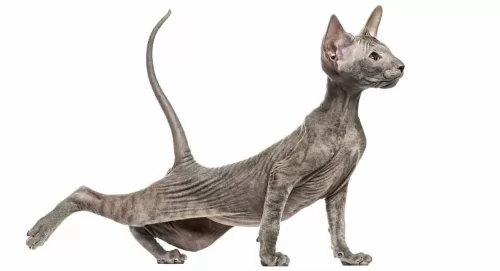 These Peterbalds are very intelligent cats and also very affectionate with their human owners. They are always up for a game and are playful and social.
These Peterbalds are very intelligent cats and also very affectionate with their human owners. They are always up for a game and are playful and social.
While they make excellent family pets and companions, one just has to take special precautions with the hairless variety and ensure that they don't become too hot or too cold.
They’re balanced in nature and adapt to the different human personalities in the household as long as its human owners are kind and respectful towards animals. With the right level of love, kindness and respect, they become ideal companions.
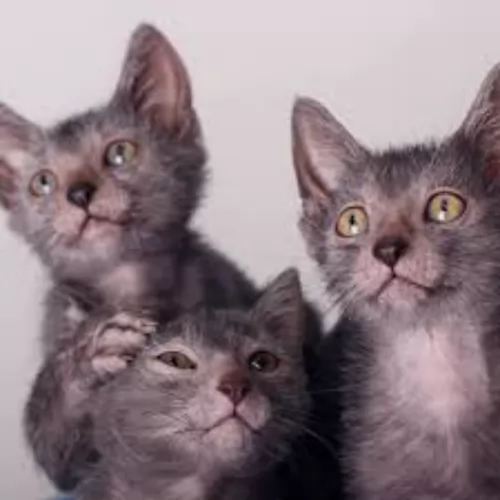 This cat is vulnerable to being cold and it should essentially be an indoor cat. If your Lykoi cat escapes, it can’t possibly keep warm on its own.
This cat is vulnerable to being cold and it should essentially be an indoor cat. If your Lykoi cat escapes, it can’t possibly keep warm on its own.
The Lykoi cat has not shown any specific health problems but being hairless, it is vulnerable to respiratory issues. Eye discharge as well as perpetual sneezing are characteristics of a cat with Feline Upper Respiratory Disease.
The cat’s mouth, sinuses, nasal passages, and upper airway are all affected. Your cat will need to get to the vet for a diagnosis and medical treatment. There are vaccines to prevent feline upper respiratory disease.
Any cat can develop this disease and your cat may have trouble breathing.
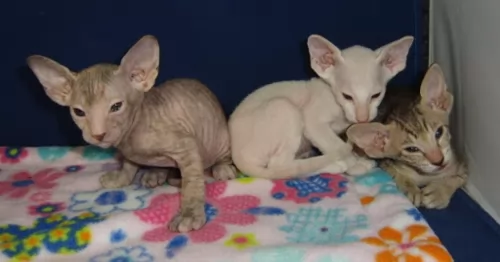 One of the more obvious things to watch out for with this particular cat is his hairlessness. This means he is more susceptible to the cold as well as to the heat. If he is outdoors, you have to be careful with his skin as it could get burned. Rough play with children could also cause scratching of the sensitive skin.
One of the more obvious things to watch out for with this particular cat is his hairlessness. This means he is more susceptible to the cold as well as to the heat. If he is outdoors, you have to be careful with his skin as it could get burned. Rough play with children could also cause scratching of the sensitive skin.
This particular cat is a fairly new breed and so there are few genetically inherited problems to be careful of.
Their large ears might prove to be a problem, and you will need to check the interiors and see that they remain clean. Also, trim his claws. If you fear that you could hurt your cat while attempting to groom him, rather take him along to professional, reputable pet groomers or have your vet do these grooming processes for you.
Whenever your Peterbald is sick you will need to get him to the vet. As it is, as a kitten, he will need to be taken to the vet to have his regular vaccines to protect him from some of the deadly cat diseases there are.
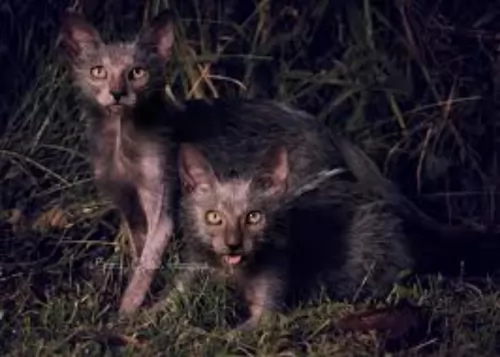 With the Lykoi’s lack of a coat, it isn’t going to require too much grooming. However, you have to keep a watch on this cat as without hair, he is vulnerable to sunburn and to getting cold.
With the Lykoi’s lack of a coat, it isn’t going to require too much grooming. However, you have to keep a watch on this cat as without hair, he is vulnerable to sunburn and to getting cold.
The cat has oily skin and it’s one cat breed that will need a bath occasionally. Some people recommend it once a week. Use warm water and a special pet shampoo recommended by your vet. Every trace of shampoo will need to be washed off to avoid the skin becoming irritated.
Provide your cat with food and water bowls, bedding, litter box, collar, grooming accessories and toys.
Cat food is a huge, important decision for any cat, as their very health depends on it. Commercially manufactured cat foods are available as wet and dry. Make sure you always get your cat food from a reliable source.
Some people believe in offering their cat both wet and dry options. Whatever you decide for your cat, remember that it needs to be at least 70% protein as every cat is a carnivore and requires a diet rich in protein.
If in any doubt, rather speak to your veterinarian and ensure that your Lykoi is getting the best food there is to promote good health. Always make sure that your cat has access to fresh cool water night and day.
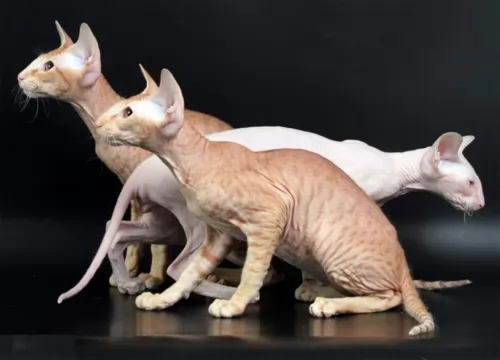 The Peterbald cat with its little or no hair is considered to be a low-maintenance cat. Their owners don’t have to worry about excessive shedding. Bathing these cats is important so that oils don't build up and cause skin irritation.
The Peterbald cat with its little or no hair is considered to be a low-maintenance cat. Their owners don’t have to worry about excessive shedding. Bathing these cats is important so that oils don't build up and cause skin irritation.
These cats are also best as indoor cats, but then again, some gentle sunshine on the skin will do him the world of good, and he loves the feel of the warm sun.
There are some Peterbald cat owners who gently bath their cats, sometimes once a week to get rid of the oil on the skin. If it isn’t possible to bath your cat, check out at your local vet as you do get special wipes for these cats that are effective in removing dirt and oil.
Also, speak to your vet about skincare and the possibility of moisturizing creams specially made for these cats and which are gentle and non-toxic.
This is a slim, athletic cat, and like all other cats, you have to be careful about weight issues. Any amount of weight with this cat can bring on a host of health issues such as extra pressure on the joints, not to mention other weight-related diseases such as diabetes and heart disease.